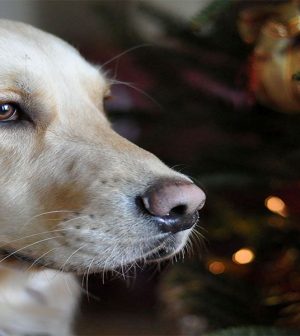- Could Your Grocery Store Meat Be Causing Recurring UTIs?
- Are You Making This Expensive Thermostat Error This Winter?
- Recognizing the Signs of Hypothyroidism
- 10 Strategies to Overcome Insomnia
- Could Artificial Sweeteners Be Aging the Brain Faster?
- Techniques for Soothing Your Nervous System
- Does the Water in Your House Smell Funny? Here’s Why
- Can a Daily Dose of Apple Cider Vinegar Actually Aid Weight Loss?
- 6 Health Beverages That Can Actually Spike Your Blood Sugar
- Treatment Options for Social Anxiety Disorder
The Holidays Can Pose Hazards to Your Pet’s Health

While you revel in the decorations and good food of the holiday season, there are dangers lurking in the tinsel and treats that can pose threats to your beloved pet.
One veterinarian offers suggestions to maintain your pet safety.
“Keep your pet from chewing or ingesting ornaments, holiday lights, electric wire and ribbons, to prevent gastrointestinal obstructions and electrocution,” said Dr. Leni Kaplan, who’s with Cornell University’s College of Veterinary Medicine.
“Consider confining your pet’s access to rooms with holiday decorations, especially when unsupervised. One easy option is to use baby gates,” she said.
Holiday fare can also be dangerous, not to mention fattening, Kaplan added.
“Restrict access to holiday snacks and treats like chocolate, coffee, caffeine, macadamia nuts, grapes, raisins and any candy or food item containing xylitol, which are toxic to pets and potentially lethal at any time of the year. Store these items in places pets cannot reach or access,” she said in a Cornell news release.
“Do not share your food, to avoid unnecessary weight gain in your pet. Have healthy snacks on hand to share, including green beans, carrots, zucchini or celery. Fatty and greasy foods can lead to vomiting, diarrhea, dehydration and, in some circumstances, pancreatitis, a serious illness which may require hospitalization,” Kaplan warned.
Stress is another concern.
“Evaluate your pet’s stress levels when hosting guests. Consider boarding pets during the holidays unless boarding is in itself a source of stress. Discuss with your veterinarian using anti-anxiety medications if indicated. Consider confining pets to a safe space, room or crate while entertaining visitors,” Kaplan said.
Also, make sure to stick to your pet’s normal routine as much as possible to enjoy a low-stress holiday season. “Build in time for walks, play and meals prior to the start of the holiday season,” she suggested.
Some flowers can be toxic to pets. While poinsettias do not pose a serious risk to pets, mistletoe and holly are dangerous. Lilies are toxic to cats, she said.
“Contact a veterinarian immediately if you suspect your pet ingested any dangerous foods, items or if they are not acting right. If traveling, be proactive and find out where and when you can seek veterinary care during the holidays in case you need it,” Kaplan advised.
More information
The ASPCA has more on pet holiday safety.
Source: HealthDay
Copyright © 2026 HealthDay. All rights reserved.










